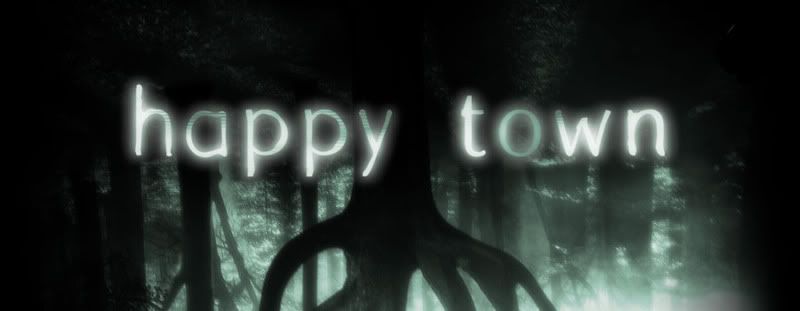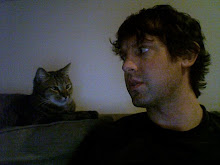
Happy Town hasn't even been on ABC for a month yet and already the axe has come down. Is this an irrational move on ABC's part? Some might say yes, as similar fates have met more recent shows like Life on Mars (with whom Happy Town shares its showrunners,) The Unusuals and Pushing Daisies. However, this time around something tells me that there will be few fan campaigns to urge the continuance of the mystery of the Magic Man (statistics based solely on the dwindling numbers of the Facebook Fan page.) So who is to blame here? Did ABC mismarket the show? Not when there was a strategically placed extended TV spot during the last five weeks worth of Lost, the key demographic for a show like Happy Town during the network's highest rated scripted hour. The show was relatively well advertised, playing up its shock horror and mystery aspects, so where did Happy Town take a wrong turn?
The Track Record Stands
As it stands, showrunners Josh Appelbaum, Andre Nemec and Scott Rosenberg don't have the best televised track record (October Road, Life on Mars both short lived and canceled early.) The pattern should tell you something. These guys can't handle their ideas. The audience either isn't getting what they want or being given a reason to continue watching. Even within the first two episodes of Lost or even Heroes there were more questions than answers but there was still a general consensus of what the main idea of the show was (Lost - why have these seemingly interconnected individuals landed on this mysteriously uninhabited yet thoroughly dangerous island, and Heroes - While people around the world are discovering abilities, how do they converge into the destruction of an entire city, though this idea was quickly run into the ground and mishandled in its own special way.) Two episodes in to Happy Town, there is very little that holds any of the plethora of ideas together. There's the enigmatic "Magic Man" of which people in town either don't know anything or are unwilling to talk about (yet the audience would benefit from even the slightest hint as to why this figure is such a local taboo,) the new girl with an ulterior motive, the batshit crazy, self-surgical sheriff and a bread factory. But what does all this have to do with anything on the show? Is the sluggish pacing and overtly precarious mystery placement the culprit for cancellation? There's also the instances of poorly written dialog and inherently illogical character behavior. Whether or not the town of Haplin is a beacon of darkness in a more or less chipper Northern MidWest, you'd be hard pressed to find police procedures that would think it a good idea to inform the next of kin in front of a room full of co-workers and visiting school children. When it comes down to it, a scene like this only serves for an over the top dramatic effect. It's not creepy, it's just stupid. Then there's the over-explanatory dialog to characters that probably already know the details, creating a roundabout break in the fourth wall while the characters all but look out toward the audience to catch them up to speed. A cardinal rule in most writing is "show don't tell." From the starting block, Happy Town has been all tell and no show and what they do decide to show makes little to no sense in context. Are these problems fixable? Perhaps, but then there are the characteres.
Who Are These People?
There are well over twelve major characters in Happy Town. Juggling an ensemble cast like this is no easy task, something J.J. Abrams and Joss Whedon can attest to on more than one occasion. Why do you think police and medical procedural shows stick to a main cast of two or three and a supporting cast of another three or four. So you do the math, two episodes come in at around an hour and a half which is not nearly enough time to set up motivations, back stories, or even the rudimentary sense of who any of these characters are, given the depth of "mystery" that is attempted in this series thus far. Needless to say, delegating the wooden Geoff Stults as the paper thin lead character is a mistake in and of itself. As an "everyman" with a chiseled jaw and strep throat-raspy drawl, this is the character that will usher us through the town of Haplin and crack the inexplicible mystery of "The Magic Man" and that weird supernatural CG hawk. Brawny physical CW appearance aside, Stults just doesn't have the acting chops of a leading man. He reads the lines and delivers the dialog, but we get no sense of character or purpose, and the real shame is that he's surrounded by A-list veterans that can and have held their own on the big and small screens. Which brings me to...
A Star is Boring
I've always said that even the strongest of casts can't save shoddy writing. It takes a lot to make performances from Frances Conroy (Six Feet Under), Sam Neill (Jurassic Park) and Stephen Weber (Wings, Studio 60 on the Sunset Strip) seem second rate and forgettable. Dropping them into uninspired, underdeveloped side characters is likely the biggest mistake the show has made. Granted these aren't the easy on the eyes, gorgeously chiseled starlets that make the visual draw (though arguably Amy Acker IS and is still left to the side as the ho-hum housewife to mannequin husband Geoff Stults) but these thesps CAN act and carry a scene. However, these scenes are too short lived and too inconsequential to really matter in the long run.
The Lynch Derivative
Of course there were comparisons to Twin Peaks from the get go, and you'd be hard pressed not to make the parallel between the two. Each involved a small, seemingly normal town with very mysterious and clandestine goings on. The difference with Twin Peaks being that David Lynch operates on an entirely different wavelength than mainstream network television (and most human beings in general.) Even when things in town are supposed to be normal there's something inherently off kilter about everything and when things are getting increasingly strange, the reactions are oddly unsuspicious. It's these disparities from what we see as the norm that made Twin Peaks the suspenseful cult hit that is was. The more normal things seemed, the more impactful the strangeness became when it presented itself. We're not in Haplin for more than a couple of minutes when people start acting suspiciously bizarre and dropping hints that "Happy Town ain't all that Happy." Everyone is aware they're on a strange show so that when something strange happens, it's expected and falls flat as a thematic device. It could have been presented as a normal mystery series, but goes out of its way to be bizarre just for the sake of using wacky imagery and including pseudo-poetic musings from the mentally unstable trough of characters. Even still, despite Peaks' current status as a cult legacy, it was canceled after only 2 seasons. Long story short, don't attempt to emulate David Lynch unless your name is David Lynch.
In the End
So do I think ABC pulled the plug prematurely? Yes, in a way. Though, did Happy Town really stand a fighting chance in today's scripted TV economy? No, there was almost no way the show would've succeeded beyond the initial 8 episode order, especially with a pilot as uneven and hackneyed as "In This Home on Ice." Two episodes isn't nearly enough for a cult following so it's not likely too many tears will be shed at the demise of yet another Lost-Replacement-Contender. After tonight's episode, the remaining 5 episodes will burn off in the summer and the town of Haplin will quietly fade into the forgotten realms of the TV archives alongside the likes of Point Pleasant and Wonderfalls.







No comments:
Post a Comment